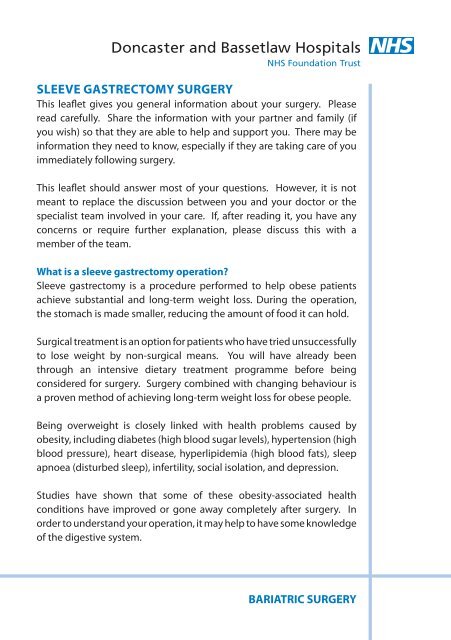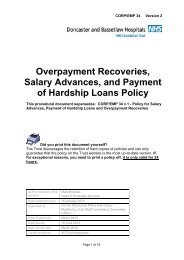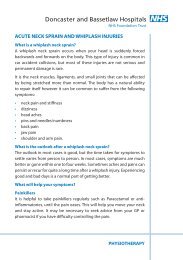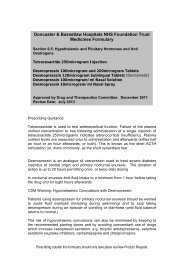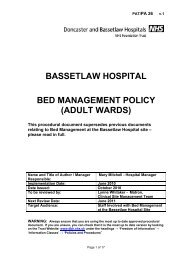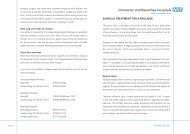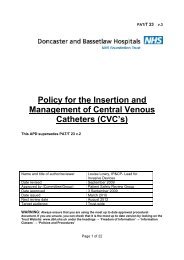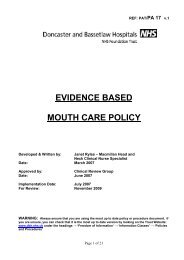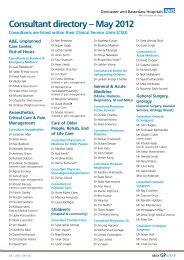SlEEvE GASTRECTomY SURGERY
SlEEvE GASTRECTomY SURGERY
SlEEvE GASTRECTomY SURGERY
You also want an ePaper? Increase the reach of your titles
YUMPU automatically turns print PDFs into web optimized ePapers that Google loves.
<strong>SlEEvE</strong> <strong>GASTRECTomY</strong> <strong>SURGERY</strong><br />
This leaflet gives you general information about your surgery. Please<br />
read carefully. Share the information with your partner and family (if<br />
you wish) so that they are able to help and support you. There may be<br />
information they need to know, especially if they are taking care of you<br />
immediately following surgery.<br />
This leaflet should answer most of your questions. However, it is not<br />
meant to replace the discussion between you and your doctor or the<br />
specialist team involved in your care. If, after reading it, you have any<br />
concerns or require further explanation, please discuss this with a<br />
member of the team.<br />
What is a sleeve gastrectomy operation?<br />
Sleeve gastrectomy is a procedure performed to help obese patients<br />
achieve substantial and long-term weight loss. During the operation,<br />
the stomach is made smaller, reducing the amount of food it can hold.<br />
Surgical treatment is an option for patients who have tried unsuccessfully<br />
to lose weight by non-surgical means. You will have already been<br />
through an intensive dietary treatment programme before being<br />
considered for surgery. Surgery combined with changing behaviour is<br />
a proven method of achieving long-term weight loss for obese people.<br />
Being overweight is closely linked with health problems caused by<br />
obesity, including diabetes (high blood sugar levels), hypertension (high<br />
blood pressure), heart disease, hyperlipidemia (high blood fats), sleep<br />
apnoea (disturbed sleep), infertility, social isolation, and depression.<br />
Studies have shown that some of these obesity-associated health<br />
conditions have improved or gone away completely after surgery. In<br />
order to understand your operation, it may help to have some knowledge<br />
of the digestive system.<br />
BARIATRIC <strong>SURGERY</strong>
Understanding digestion<br />
From the mouth, food passes through the oesophagus (gullet) into<br />
the stomach, where it remains for several hours during digestion and<br />
is broken down into a semi-solid form. It then passes into the small<br />
bowel where further digestion and absorption of nutrients takes place.<br />
The remaining digestive product continues into the colon (large bowel)<br />
where some water absorption occurs and then it passes from the body<br />
as waste, known as faeces.<br />
Is a sleeve gastrectomy the<br />
right choice for me?<br />
The sleeve gastrectomy works<br />
by restricting your portion<br />
sizes and the types of food<br />
that you can eat. It works best<br />
for people where large food<br />
portion sizes are contributing<br />
to being over weight.<br />
The sleeve gastrectomy is<br />
less successful for people<br />
who snack, as it gives little<br />
restriction to foods such as<br />
chocolate, crisps, biscuits,<br />
cake, and ice cream.<br />
How does the sleeve gastrectomy work?<br />
The operation reduces the size of the stomach by approximately<br />
75%, creating a narrow tube. It is done by stapling down the stomach<br />
and removing the remainder of the stomach. The surgery is usually<br />
performed laparoscopically (keyhole surgery), through fi ve to six (5-6)<br />
very small cuts instead of one large cut on your abdomen.<br />
The new stomach only has the capacity to hold up to 200ml of fl uid at<br />
any one time. This means that the amount of food you will be able to eat<br />
will be much smaller. The new small stomach still works in the same way<br />
but will feel full quicker.<br />
BARIATRIC <strong>SURGERY</strong><br />
oesophagus<br />
Stomach<br />
Small bowel<br />
Large bowel<br />
Rectum<br />
Anus
Stomach<br />
The sleeve gastrectomy can sometimes be used as part of a two-stage<br />
operation when the anaesthetic risk of surgery is too great. The sleeve<br />
gastrectomy as the fi rst stage helps the patient to lose some excess<br />
weight making it safer to perform further weight loss surgery.<br />
Stomach Stomach<br />
Stomach<br />
Stomach following sleeve gastrectomy<br />
How does the operation aff ect eating?<br />
You will need to make changes to your diet after your operation. In doing<br />
this, you will be supported by the specialist dietitian. For your operation<br />
to be eff ective and to maximise weight loss, it is important that you make<br />
life-long changes to your diet and lifestyle. You must be committed to<br />
making changes and following the guidance that you are given by your<br />
surgeon and the rest of the medical team. You should not consider this<br />
treatment if you do not feel able to make these commitments.<br />
Remember - surgery can only be successful if you commit to making the<br />
necessary dietary and lifestyle changes. The operation is only a tool to<br />
assist you to lose weight; the success depends on you.<br />
What diet will I have to follow once I have had the operation?<br />
The dietitian will visit you on the ward to discuss your diet after your<br />
operation. You will be provided with a diet sheet. After this, you may<br />
be required to follow a fl uid-only diet for a short period followed by a<br />
pureed diet, then onto a soft diet, and fi nally a normal textured diet.<br />
Progress through the stages varies between individuals.<br />
BARIATRIC <strong>SURGERY</strong>
It is important not to try to move through the stages too quickly as you<br />
are more likely to suffer from vomiting.<br />
The diet you should follow long-term will be a diet low in fat and sugar.<br />
Your dietitian will provide you with dietary guidance and ongoing<br />
support and advice individual to your needs and progress.<br />
It is important to maintain regular contact with your dietitian before and<br />
after the operation.<br />
What are the benefits of having a sleeve gastrectomy operation?<br />
The operation helps you to achieve long-term weight loss.<br />
Achieving and maintaining significant weight loss reduces healthrelated<br />
problems, such as:<br />
• type 2 Diabetes<br />
• hypertension (high blood pressure)<br />
• coronary heart disease<br />
• osteoarthritis<br />
• high cholesterol<br />
• obstructive sleep apnoea (difficulty breathing at night).<br />
Laparoscopic surgery has the benefits of:<br />
• smaller incisions (cuts)<br />
• reduced pain<br />
• reduced risk of infection<br />
• shorter hospital stay.<br />
What are the risks and complications<br />
Most people have few problems during and after surgery. All surgery<br />
has risks, sometimes there may be complications or difficulties.<br />
Risks include:<br />
• thrombosis (blood clot)<br />
• heart attack<br />
• internal bleeding<br />
• post operative wound infection<br />
BARIATRIC <strong>SURGERY</strong>
• chest infection<br />
• death due to problems during the operation (rare).<br />
Additional risks associated specifically with this surgery are:<br />
• leak along the line of staples<br />
• wound infection<br />
• hernia.<br />
Any pre existing conditions may further increase your risk with this<br />
surgery. These will be discussed with you at the time your consent is<br />
taken to proceed with surgery. Please ask any questions or discuss any<br />
concerns at this time.<br />
It may be necessary to change to open surgery (larger incision) if it<br />
proves impossible to perform your surgery laparoscopically.<br />
What happens before surgery?<br />
Before being referred for surgery, you will have already tried to reduce<br />
your weight and alter your eating habits. This process will have been<br />
supported by your GP and/or specialist dietitians in the community.<br />
You may have already been to an information seminar led by the<br />
surgeons, specialist nurses, and dietitians to give you details of potential<br />
surgery, lifestyle changes, diet, and long-term outcomes. This may have<br />
also provided you with an opportunity to meet other people, who are<br />
also considering weight loss surgery.<br />
outpatient appointment<br />
At your first outpatient appointment, you will meet the surgeon,<br />
dietitian, and specialist nurse. They will examine you and discuss the<br />
operation, if surgery is a suitable option for you. Following this initial<br />
assessment, your care and treatment plan will be discussed with the<br />
wider Multi-disciplinary Team (MDT), which also includes an anaesthetist<br />
and endocrinologist.<br />
BARIATRIC <strong>SURGERY</strong>
Pre-operative assessment<br />
If surgery is a safe and suitable option, you will attend the pre-operative<br />
assessment clinic where full details of your medical history are taken and<br />
routine pre-operative tests and examinations are completed. These will<br />
include: blood tests, ECG (heart trace), and weight, if this has not already<br />
been recorded at your outpatient appointment. You may be seen and<br />
examined by the anaesthetist at this time so that they can prepare for<br />
your anaesthetic. Full verbal and written information related to your<br />
surgery will be given to you and you will be asked to sign a consent form<br />
and given a copy, detailing risks and information so that you can take it<br />
away and consider. On admission to hospital part two of the consent<br />
process will be completed, checking nothing has changed in your<br />
condition and confirming consent. You will also receive instructions on<br />
how and when to go on to the pre-operative liver-reducing diet.<br />
We recommend that you stop smoking before your operation as smoking<br />
increases your risks during anaesthetic. The pre-operative assessment<br />
nurse will give you information to help you stop smoking.<br />
Pre-operative liver reducing diet<br />
You will be advised by your dietitian to follow a specific diet during the<br />
two weeks before your operation. The aim of this diet is to reduce the<br />
glycogen stores in the liver and so reduce the size of your liver. This ‘liver<br />
shrinking’ diet makes it easier for the surgeon to access your stomach<br />
and perform the operation and reduces the risks of the anaesthetic.<br />
It is very important this diet is strictly followed.<br />
You may be tempted to have a special or larger meal before surgery, but<br />
this will reverse the effects of the diet. If you do not follow this diet, it<br />
may not be possible to perform the operation.<br />
Before the operation, you should do your best to lose weight and do<br />
some physical activity where possible. This will help you to be healthy for<br />
surgery and decrease complications after surgery. You will have had the<br />
opportunity to speak to the surgeon, specialist dietitian, and specialist<br />
nurse about the operation where your questions and concerns will be<br />
addressed.<br />
BARIATRIC <strong>SURGERY</strong>
What happens on admission to hospital?<br />
You will be admitted to hospital either the day before your surgery or on<br />
the morning of your surgery, depending on what you have been told at<br />
your pre-operative assessment visit.<br />
You will be offered a bed in a side room on the ward or in a bay with two<br />
or three other patients. You may be on a ward where there are both male<br />
and female patients but there will only be patients of the same sex in<br />
individual bays.<br />
On admission to the ward, the doctors and nurses will answer any further<br />
questions you may have. A nurse will check that there have been no<br />
significant changes in your health since your pre-operative assessment,<br />
and your temperature, pulse, and blood pressure will be recorded.<br />
Other health professionals may see you before surgery, including<br />
the anaesthetist, pharmacist, or physiotherapist. You may be asked if<br />
medical students may be involved in your care. You do not have to agree<br />
to this.<br />
Before going to the operating theatre, you will be asked to put on a gown<br />
and compression (antiembolic) stockings that promote blood flow in the<br />
deep veins in your legs and so reduce the risk of developing blood clots.<br />
You will be asked to continue to wear these for approximately six weeks<br />
after your surgery or until you have regained your full mobility.<br />
What type of anaesthetic will I have?<br />
You will have a general anaesthetic for your surgery, which means you<br />
will be asleep throughout the procedure. The anaesthetist will discuss<br />
your anaesthetic and any potential risks and complications with you<br />
before the operation.<br />
What should I expect after the operation<br />
From the operating theatre, you will be transferred to the theatre<br />
recovery room where you will wake up from your anaesthetic and then<br />
be taken to the ward for further recovery. It may be necessary for some<br />
patients to initially spend some time in the Department of Critical Care<br />
(DCC). More intensive nursing and observation is provided in DCC.<br />
BARIATRIC <strong>SURGERY</strong>
Patients with sleep apnoea and/or respiratory complications may go to<br />
DCC from theatre. The possibility of this will have been discussed with<br />
you at your pre-operative assessment appointment.<br />
Immediately after the operation, you will be monitored closely by the<br />
nursing and medical staff. Your pulse, blood pressure, breathing, and<br />
wounds will be checked regularly and you may receive oxygen until you<br />
are fully awake.<br />
You will have an intravenous infusion (drip) in your arm to give you fluids<br />
until you are able to take fluids by mouth. Sometimes anaesthetic makes<br />
people feel sick so it is important that you tell the nurses if you feel sick.<br />
They will offer you an injection to help settle the sickness.<br />
Most patients have some pain after this operation. It is important to tell<br />
the nurses if you are in pain and you will be given pain killers either by<br />
an injection or by mouth.<br />
You will be encouraged to get out of bed and move around on the same<br />
day as your operation. It is very important to move around as soon<br />
as possible after surgery in order to reduce the risk of blood clots and<br />
prevent problems with your chest.<br />
The dietitian will visit you on the ward to discuss your diet and provide<br />
you with written information. The dietitian will also discuss how you<br />
will now need to eat, increasing your intake gradually and changing the<br />
consistency of the foods you are eating over time.<br />
You will have regular appointments with the dietitian after your operation<br />
in order to help you adjust your diet and maximise your weight loss.<br />
Going home from hospital – what do I need to know?<br />
Most patients will be able to go home between 2-4 days after surgery,<br />
though everyone is different and some may require a longer hospital<br />
stay.<br />
Your abdominal area is likely to feel sore and bloated for a few weeks.<br />
This is normal.<br />
BARIATRIC <strong>SURGERY</strong>
During this time, and as you need them, take the painkillers given to you<br />
by the hospital or a mild painkiller, such as paracetamol. It is important<br />
to check your wound sites for signs of infection (pain, heat, and redness).<br />
You must see your GP if you are concerned about your wound sites.<br />
Following your discharge from hospital, you will probably feel tired and<br />
need to rest but this will improve.<br />
It will normally take 3 - 6 weeks for you to resume your normal activities.<br />
You should avoid lifting anything heavy for four weeks.<br />
You must not drive until you can wear a seat belt comfortably and you<br />
are able to do an emergency stop. It is advisable to check with your own<br />
car insurance company first.<br />
As you begin to feel better, you must incorporate gentle exercise into<br />
your daily routine, such as walking or swimming. As you start to lose<br />
weight, you will feel more energetic and able to undertake more exercise.<br />
Sexual activities may be resumed once it is comfortable for you.<br />
What medication will I need?<br />
When you are discharged from hospital, you will be given a supply of<br />
blood-thinning injections to be given each day for 10 days after your<br />
operation. These are small injections into the skin of your abdomen.<br />
Usually you will be taught by the nursing staff to give these injections<br />
yourself.<br />
If some of the tablets you take are too large, the pharmacist or doctors<br />
may change these to dissolvable or chewable tablets, or give the<br />
medication in syrup form.<br />
If you are on medication for diabetes or high blood pressure, you may<br />
need to have regular checks with your GP or practice nurse to monitor<br />
your condition and medication accordingly. You may be required to take<br />
mineral and vitamin supplements and the dietitian will discuss this with<br />
you before and after surgery.<br />
BARIATRIC <strong>SURGERY</strong>
You will also need to have vitamin B12 injections once every three<br />
months for the rest of your life. This can be arranged by your GP and<br />
given to you by your practice nurse.<br />
What will my follow up care be?<br />
You will be asked to attend the outpatient clinic approximately six weeks<br />
after your operation. This is to enable the team to assess your recovery.<br />
Following this, you will be seen by the nurse specialist and the dietitian<br />
after three months, six months, 12 months and two years. After two years,<br />
you will be discharged back to your GP and local weight management<br />
service.<br />
You will be given the telephone number of the specialist nurse and the<br />
dietitian to contact for any advice you may need at any other time.<br />
Is there any other support available?<br />
As the patients who have this surgery grow in numbers, it is expected<br />
that a patient support group will be formed. The nurse specialist will<br />
advise you of such groups or other relevant support available.<br />
How this surgery and weight loss will affect my life?<br />
As you start to lose weight after your surgery, you can expect to feel<br />
much healthier. However, you must remember that these changes will<br />
affect your everyday life: going out for meals, buying clothes, going on<br />
holiday, etc. Support from your family and friends is important while you<br />
make adjustments to changes in your life.<br />
Many patients, who lose a large amount of weight, will have loose skin,<br />
usually around the stomach and at the tops of the arms and legs. Your<br />
GP will need to refer you separately to a plastic surgeon if this skin is to<br />
be removed. This plastic surgery is not part of the sleeve gastrectomy<br />
surgery and is not guaranteed once you start to lose weight. It is<br />
important to remember that this will only be considered when enough<br />
weight has been lost and is being maintained.<br />
For our female patients, we advise you not to become pregnant for at<br />
least 2 years after your operation as your body needs an appropriate<br />
BARIATRIC <strong>SURGERY</strong>
amount of time to adjust. If you are planning to become pregnant, it is<br />
important that the doctors, midwives, and dietitians are aware that you<br />
have had a sleeve gastrectomy.<br />
Contacts<br />
Katie Holler, Clinical Nurse Specialist<br />
Tel: 01302 366666 ext 4294<br />
Mobile 07766 070570<br />
John Finney, Specialist Dietitian<br />
Tel: 01302 366666 ext 4110<br />
Mobile 07887 503428<br />
Carol Callaghan, Secretary to Bariatric Consultant Surgeon<br />
Tel: 01302 647234<br />
Jodie Stott, outpatients Co-ordinator<br />
Tel: 01302 647018<br />
Useful websites for further information<br />
www.bospa.org<br />
– British Obesity Surgery Patients Association.<br />
www.british-obesity-surgery.org<br />
– British Obesity and Metabolic Surgery Society.<br />
BARIATRIC <strong>SURGERY</strong>
WPR33380<br />
w 2010<br />
BARIATRIC <strong>SURGERY</strong>


